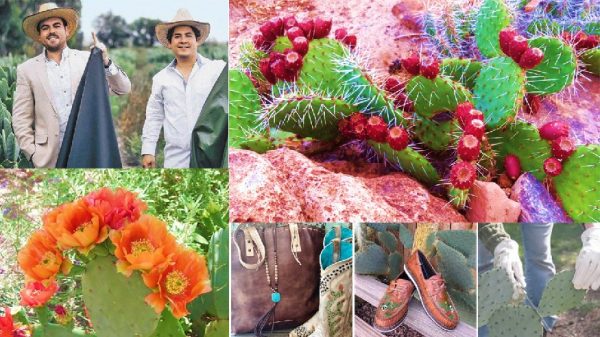
Leather from Prickly pear cactus
In a new plant based innovation, Mexican staple crop Nopal cactus or prickly pear cactus is used for making plant-based leather. Nopal cactus is national symbol of Mexico and is a staple food for Mexicans. Nopal cactus is rich with fiber, antioxidants and holds a place in Mexican restaurants and kitchens. Salads, meats, poultry, cheese, avocado, egg dishes, corn tortillas, fruit juice and delicious candies – are some of the foods that will have Nopal cactus as one of the ingredients. It can be sautéed and used as an ingredient for many dishes with tomatoes and onions. Apart from this, it is also used as a feed for livestock. In Mexico Nopal cactus is cultivated in millions of acres along with fruits and vegetables. Its fruits are edible.
This prickly cactus also has several medicinal properties. Being antioxidant rich it helps in reducing cholesterol, good for blood sugar level control, protects nerve cells and has anti-inflammatory product. The red purple variety of the cactus known to contain more antioxidants.
Such a powerful plant has gained more popularity recently for all good reasons. Two young inventors from Mexico invented first organic plant leather made entirely from this prickly pear cactus. This leather is invented as a stylish, sustainable and eco-friendly alternative to leather!
Adrian Lopez and Marte Cazarez, are the two young innovators who exhibited their invention recently in Milan, Italy in an International leather trade exhibition. They presented this innovation as a substitute for leather to the top designers who are in hopes that this could be the staple leather for fulfilling the demand of luxury fashion industry.
Both men worked for two years to innovate plant leather and they claim that this leather is environmentally sustainable and entirely plant based. This leather is also breathable and lasts for a decade.
This innovation can replace inferior faux leathers made with petroleum-based plastics which are hard to maintain, less breathable and hard to clean. In recent years, nopal fiber that can be used in aeronautics industry or as a substitute for plastic straws and cutlery are invented by Mexican inventors. These ecofriendly substitutes are like banana plant products which are biodegradable.
Despite being called crazy, the two inventors went ahead in manufacturing the leather from the cactus. The idea of extracting leather from the cactus came because Nopal cactus also has many cosmetic applications and used in both creams and shampoo. This usage of the cactus on the skin, gave them the idea for the inventors. If it is good for skin, then it should be used to create leather as it goes on skin. They also got inspired by Italian textile made from the waste from apple processing and Spanish textile woven from fibers of discarded pineapple leaves.
According to Lopez “Mexico has the potential to innovate, with nopal, which is the symbol of the country. But so many people told us we were crazy! Even our engineers told us that that could not be done. We said: ‘why not? We are in Mexico, we are Mexicans, what raw material is more suitable for us to exploit than nopal? It grows by itself, it doesn’t need much watering, it doesn’t waste much water.’ That’s when we began to experiment with the nopal and, after several tests, we were able to develop a resistant material.”
“Any leather can be replaced with organic alternatives; animal leathers or synthetic leathers can be replaced by organic alternatives. This is the cycle, and it supports our ecosystem.”
After many trial and error both Lopez and Cazarez made a breakthrough this year when they devised an organic blend of cactus and cotton with the proper hand feel and with attractive look that consumers desire. They both guarantee that their product can last for 10 years and has properties that required by furniture, leather goods, fashion and automotive industries. The leather can be used for manufacturing small dress, purse, belt, watch strap, bookcase or an armchair according to Cazarez.
Both inventors also want to assist the farmers who grow the Napol cactus. “It makes our work more meaningful because this isn’t only about fashion and the environment. We also want to somehow support workers in the fields and create jobs, even indirectly.”
This is another promising plant based innovation that can be stop and replace use of plastics and, killing animals for leather.
References: https://themindunleashed.com
Author: Sumana Rao | Posted on: October 17, 2019
« Network to prevent food fraud in Asian Nations Dhokla or Samosa -Junk food ban in Indian schools »






















Write a comment